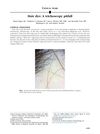 49 citations,
July 2009 in “Journal of the American Academy of Dermatology”
49 citations,
July 2009 in “Journal of the American Academy of Dermatology” Some people experienced hair loss after mesotherapy treatments for hair loss.
 44 citations,
November 2010 in “Current Opinion in Supportive and Palliative Care”
44 citations,
November 2010 in “Current Opinion in Supportive and Palliative Care” Many patients find hair loss from chemotherapy very distressing, and while treatments like minoxidil and scalp cooling may help, there is no sure way to prevent it.
 44 citations,
March 1991 in “International Journal of Dermatology”
44 citations,
March 1991 in “International Journal of Dermatology” Prompt treatment of inflammatory tinea capitis (kerion) is crucial to prevent scarring and hair loss.
 33 citations,
February 1996 in “Journal of The American Academy of Dermatology”
33 citations,
February 1996 in “Journal of The American Academy of Dermatology” Treat scalp and beard fungal infections early with oral antifungal medication and sometimes topical therapy, avoiding unnecessary allergy tests and surgery.
29 citations,
September 2008 in “Dermatologic Therapy” Lasers and light sources are effective for removing unwanted hair.
 26 citations,
August 2018 in “American Journal of Clinical Dermatology”
26 citations,
August 2018 in “American Journal of Clinical Dermatology” Hair loss in cancer patients can be related to the cancer itself, treatment, or other conditions, and understanding it is important for diagnosis and patient care.
 21 citations,
July 2002 in “Clinical and Experimental Dermatology”
21 citations,
July 2002 in “Clinical and Experimental Dermatology” Hair care products don't cause hair loss if used correctly.
 20 citations,
January 1979 in “JAMA”
20 citations,
January 1979 in “JAMA” Fiber implantation for baldness is not recommended because it causes many problems and doesn't work well.
 19 citations,
May 2011 in “Dermatologic Therapy”
19 citations,
May 2011 in “Dermatologic Therapy” The document suggests using hairpieces, wigs, and safe cosmetic techniques to hide hair loss from alopecia areata.
 13 citations,
January 2014 in “Dermatology”
13 citations,
January 2014 in “Dermatology” Radiation-induced alopecia after angioembolization usually heals on its own and can look like other hair loss types, but patient history helps prevent misdiagnosis.
 10 citations,
January 2016 in “Dermatology Online Journal”
10 citations,
January 2016 in “Dermatology Online Journal” Hormonal therapy in transgender patients can lead to skin changes like altered sebum production, hair growth, and acne, which may require dermatological care.
10 citations,
January 1994 Hair can be straightened using different chemicals, not just strong alkali.
 9 citations,
November 2012 in “Hepatology Research”
9 citations,
November 2012 in “Hepatology Research” A man lost all his hair permanently after hepatitis C treatment, a side effect not seen before.
 9 citations,
August 2008 in “Journal of Oral and Maxillofacial Surgery”
9 citations,
August 2008 in “Journal of Oral and Maxillofacial Surgery” A woman experienced temporary hair loss after jaw surgery, which can be reduced by careful head positioning during the operation.
 9 citations,
August 2001 in “PubMed”
9 citations,
August 2001 in “PubMed” Hair loss can often be reversed with the right treatment.
 6 citations,
March 2015 in “Journal of The American Academy of Dermatology”
6 citations,
March 2015 in “Journal of The American Academy of Dermatology” Hair dye can make it hard to diagnose scalp conditions correctly.
6 citations,
October 2006 in “International Journal of Dermatology” Hair splitting and nail detachment are linked conditions.
 6 citations,
March 2003 in “PubMed”
6 citations,
March 2003 in “PubMed” Small amounts of DNA can be found in the hair shaft, especially near the root, but it decreases with hair treatments and washing.
 5 citations,
August 2005 in “Facial Plastic Surgery Clinics of North America”
5 citations,
August 2005 in “Facial Plastic Surgery Clinics of North America” Midface surgery complications are generally rare and manageable with skilled surgery and informed patients.
 5 citations,
September 1986 in “Pediatric Dermatology”
5 citations,
September 1986 in “Pediatric Dermatology” A family showed a new condition with inherited hair loss and skin changes, possibly due to one genetic disorder.
 5 citations,
October 1984 in “The BMJ”
5 citations,
October 1984 in “The BMJ” Up to 50% of scalp hair can be lost before it appears thin, and treatment is only needed for hair loss caused by diseases or deficiencies.
2 citations,
May 2020 in “Journal of the American Academy of Dermatology” Using certain hair products may increase breast cancer risk in black women.
 2 citations,
January 2019 in “Case Reports in Dermatology”
2 citations,
January 2019 in “Case Reports in Dermatology” A 66-year-old woman's thick scalp and hair loss were confirmed as lipedematous alopecia, a rare condition possibly influenced by genetics, with no effective treatment known.
 2 citations,
August 2016 in “Lasers in Surgery and Medicine”
2 citations,
August 2016 in “Lasers in Surgery and Medicine” Photodynamic therapy can remove nonpigmented hair in mice and might work for humans.
 2 citations,
January 2012 in “InTech eBooks”
2 citations,
January 2012 in “InTech eBooks” Chemotherapy often causes hair loss, which usually grows back within 3 to 6 months, but there's no effective treatment to prevent it.
 1 citations,
January 2021 in “Dermatology online journal”
1 citations,
January 2021 in “Dermatology online journal” A unique case showed a rare combination of two types of lichen planus on the face.
 1 citations,
January 2021 in “Skin appendage disorders”
1 citations,
January 2021 in “Skin appendage disorders” Chemotherapy patients don't all lose their hair due to factors like hair growth rates, age, genetics, and the type of drugs used.
 1 citations,
April 2010 in “Expert Review of Dermatology”
1 citations,
April 2010 in “Expert Review of Dermatology” The document concludes that early diagnosis and treatment are crucial for managing rare hair loss disorders and that more research is needed to improve treatment strategies.
1 citations,
January 2009 in “Elsevier eBooks” Lasers can reduce hair growth but may also damage skin.
 April 2023 in “Journal of Investigative Dermatology”
April 2023 in “Journal of Investigative Dermatology” Some patients who had a severe drug reaction developed long-term hair loss.

























